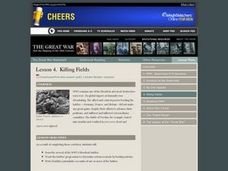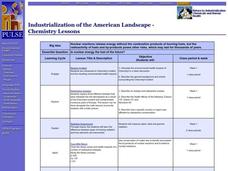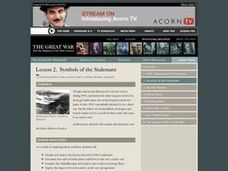Curated OER
Kosovo: Where is It and What's All the Fuss About?
Students investigate the US military involvement in Kosovo and answer teacher generated questions.
Curated OER
Extracts from History of Germany in the Nineteenth Century and Historical and Political Writings
In this World War II worksheet, high schoolers read a 2-page selection from History of Germany in the Nineteenth Century and Historical and Political Writings by Heinrich Vot Treitschke and then respond to 4 short answer questions about...
Curated OER
Breaking News English: Turkey and EU
In this Turkey and EU worksheet, learners read the article, answer true and false questions, complete synonym matching, complete phrase matching, complete a gap fill, answer short answer questions, answer discussion questions, write, and...
It's About Time
Electricity and Your Community
Young scientists read and interpret a data table about energy generation around the world. Next, they use the Internet to investigate energy generation in their own state, and, finally, pupils read a passage and answer questions about it.
Weather Bug
WeatherBug
Exploring the weather has never been more intriguing! Whether you are looking for a quick glance at the 10-day forecast, trying to figure out if lightning is heading your way, or wondering what the pollen count is, you will find out...
Delegation of the European Union to the United States
The European Union’s Economic and Monetary Union
What are the benefits of using the Euro, the EU's common currency? What are the challenges faced? As their examination of the European Union continues, class members investigate the impact on how the switch to the Euro impacted...
Global Oneness Project
Reclaiming Rivers
Robert Hass's article "Rivers and Stories" underscores the importance of rivers in the development of civilization and the importance of reclaiming supposedly dead rivers and implementing policies that protect river health. Groups...
Curated OER
Lines From Behind the Lines
Fifth graders create a timeline of events in a soldiers life. In this World War I lesson, 5th graders learn about the Great Depression and World War I. Students watch video segments about World War I and examine primary sources from...
Curated OER
Lesson 4. Killing Fields
Eleventh graders describe several of the WWI's bloodiest battles, track the battles' progression to determine advances made by leading nations, and write frontline journalistic accounts of one or more of the battles.
Curated OER
Industrialization of the American Landscape
Students explore the Chernobyl incident and the resulting environmental health impacts. They explore three different isotopes that were released into the atmosphere. Through inquiry, students determine the difference between types of...
Curated OER
Harvesting the New World: Changing Land Uses and Contact Between Cultures in Colonial Times
Ninth graders differentiate the Native American and European values. In this world history lesson, 9th graders define colonialism in their own words. They study the effects of epidemics and other diseases to Native American populations.
Curated OER
World War I (1914–1919)
In this online interactive history worksheet, students respond to 9 short answer questions about World War I. Students may check some of their answers on the interactive worksheet.
Curated OER
The European Union
Students complete an in-depth exploration of the European Union using the five themes of geography as a guide. In small groups, students use traditional and technological resources to answer questions about the European Union, with each...
Curated OER
Lesson 2. Symbols of the Stalemate
Eleventh graders identify and analyze the factors that led to WWI's stalemate. They examine The Schliefflen plan and analyze and rectify its strategic flaws.
Curated OER
Lesson 6: World War I Ends
Students study why the United States entered World War I and brainstorm what led to the German collapse on the front. They review arguments for the factors contributing to the end of the war.
Curated OER
Lesson 3. No One Spared
Eleventh graders, in groups, explore the devastation that World War I inflicted on millions of people around the world. They write a first-hand account of the impact of World war I.
Curated OER
Lesson 5. Breaking Point
Eleventh graders explore how soldiers could be pushed to desertion and mutiny and how this decision affected the outcome of the war.
Curated OER
Reenacting the Treaty of Versailles
High schoolers examine how provisions in the Treaty of Versailles contributed to events in WWII. They participate in a debate, researching their position, then presenting their national position orally to the class.
Curated OER
The Art of El Anasui: Creating a Mural with Discarded/Recycled Objects
Students create murals that feature recycled objects. In this West African art lesson, students examine artwork by El Anatsui and his commentary on social issues. Students then create murals in the style of El Anatsui using discarded...
Curated OER
Future Conditional
Students examine how toxic pollutants affect environmental and human health. They define key terms, watch a video, and answer discussion questions.
Curated OER
Anne Frank: Everything Changed for Us
Young scholars write about a time they were made to feel different, and when they were on the other side of the equation. They read other first hand accounts of times in history when people were made to feel like outsiders.






















